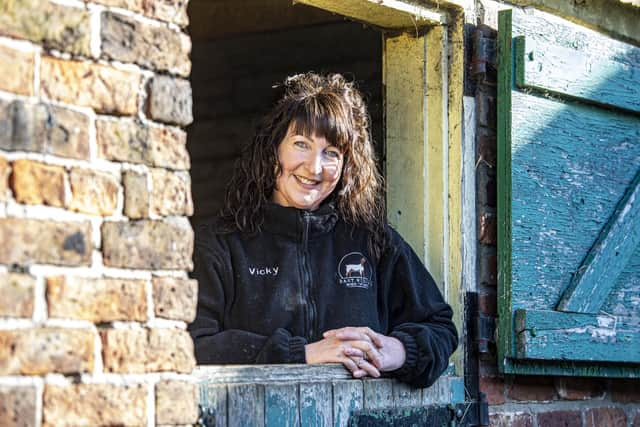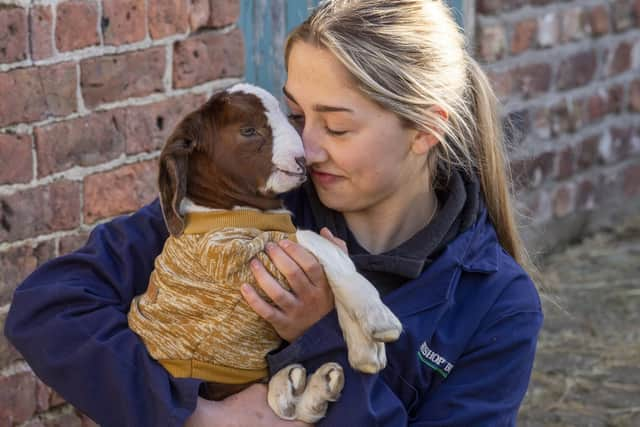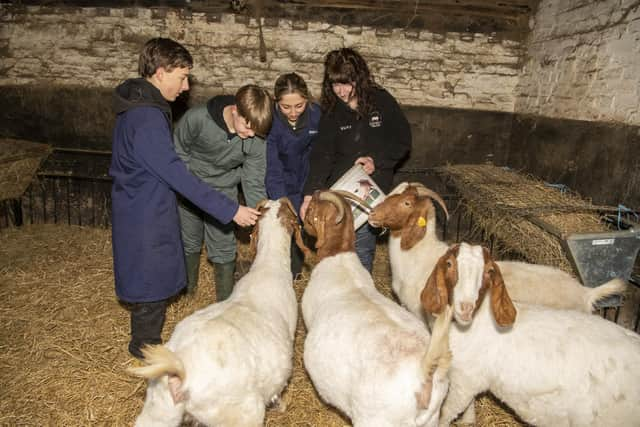Meet the former veterinary nurse who has become one of Yorkshire's leading goat breeders
Vicky Wood of Mill Farm in Beswick breeds Boer goats and said her initial plan had been founded on the growing demand for goat meat but that she is delighted with the way things have worked out.
“I’ve always liked goats, particularly Boer goats. My mum and dad had goats here for years.
Advertisement
Hide AdAdvertisement
Hide Ad“When I came back home to look after my mum four years ago I decided that I needed to generate an income and make a go of the farm. I’d seen that goat meat was up and coming.


“It is very popular in London and the popularity has spread up the country too. It is also a really healthy meat.
“I went on a road trip to Gloucestershire where I bought five pregnant Boer goats and a buck. My aim was always to have really good, quality stock and while I started by selling goats for meat it soon evolved into what it is today.”
Vicky had realised that by investing in good stock and then concentrating on improving the quality of her herd that she had something more in demand than the meat.


Advertisement
Hide AdAdvertisement
Hide AdPeople were wanting to buy her goats to set up their own herds and to keep their own goats as either pets, for farm visitor attractions, to show or as breeding stock for their own meat-producing herds.
Vicky said it altered her thinking about the direction she had been heading.
“My Boers were worth more as good breeding stock than being sent for meat production and the majority of what I sell today are sold live to go into show herds or to help other goat farmers or those who just want to have a few good-looking goats.
“We now have even better quality Boers with top bloodlines and it is just such a pleasure to be able to supply people locally and further afield with stock that they are really happy with.”


Advertisement
Hide AdAdvertisement
Hide AdVicky now has a herd of twenty breeding Boer goats and is halfway through her kidding season which takes place in February and into March, and said last year’s crop was exceptional.
“It’s nice if each of them has two kids but last year they all produced twins, triplets and quads.
“Boers can have three or four teats that work and they can produce quite a bit of milk and can rear three but for safety’s sake I tend to bottle feed the third and/or fourth kids they have.
“We have our old lady too, who isn’t a Boer but a dairy goat that has the most fantastic udder and produces enough milk to bottle feed the third and fourth kids.
Advertisement
Hide AdAdvertisement
Hide Ad“It’s hard work when that happens but it’s worth it when it comes to selling them on. We normally wean them at twelve weeks which is when they are generally sold.
“I will keep a couple of doe kids for breeding stock and will keep some buck kids too.
“We don’t castrate the males, as we will also sell some of those as breeding males. We very rarely send anything for meat these days as we always have a healthy demand for our animals.”
Vicky said her customers keep coming back and that she loves that some of her stock is being seen regularly by the public.
Advertisement
Hide AdAdvertisement
Hide Ad“Some of last year’s kids went to Bridlington Animal Park in Carnaby, where they took them for breeding and putting into their herd; and to Playdale Farm at Cayton Bay.
“I really love setting up those who want to get started with maybe three or four doe kids.
“They will often come back the following year for an unrelated buck to start breeding themselves and in some cases start showing too.
“We were all set to show our Boer goats for the first time just before the pandemic. We hope to try maybe later this year.
Advertisement
Hide AdAdvertisement
Hide Ad“Unfortunately, there aren’t a lot of shows in our area for goats apart from the Great Yorkshire Show and a lot of the shows where they are included are down south, so we will see how we go.”
Vicky said that as well as originally seeing her goats’ role as being for meat she had also been milking six goats for feeding her new-born lambs and such as puppies, up until this year, but that she doesn’t any longer.
“Milking them was just too time-consuming along with kidding, looking after the herd, plus my small flock of sheep and running our Whiskers Animal Hotel for small pets.”
Vicky said she also has Valais Blacknose and Silvernose sheep as well as two Angora goats.
Advertisement
Hide AdAdvertisement
Hide Ad“The sheep are also lambing now. I have a pedigree Valais Blacknose tup. I’ve always loved the breed but I wasn’t going to pay £3,000 or guineas for a pedigree ewe.
“When I was buying a billy goat down in Bournemouth I saw my first Silvernose and thought they would be as expensive as the Valais Blacknose but it wasn’t the case because they are a crossbreed of the Greyfaced Dartmoor put to the Valais Blacknose tup.
“I bought four from Brimham Rocks Adventure Farm. I call them the poor man’s, or in my case, the poor woman’s Valais.
“If we do show the Boers I may also show the Angoras too as they are also pedigree, but my initial reason for having them was for their wool.”
Advertisement
Hide AdAdvertisement
Hide AdVicky qualified as a veterinary nurse having trained at Norwood Veterinary Centre in Beverley.
She is married to Richard and has two daughters and a son, but the farm at Mill Farm and the animal hotel for everything from rabbits, ferrets, hamsters, guinea pigs and small birds is all down to Vicky’s love of animals.
